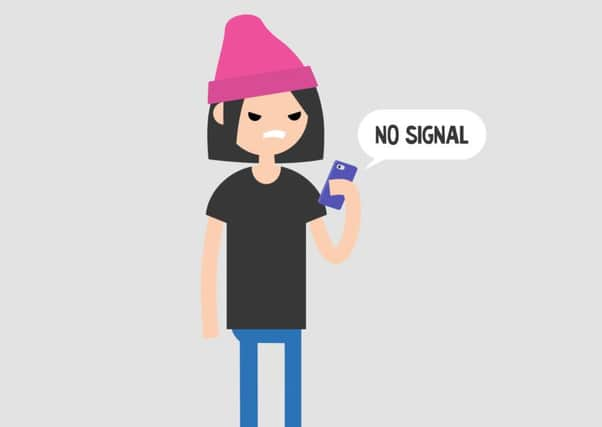James Walker: Being unable to use your mobile phone is no joke


Much amusement has been had on the internet when phone networks went down, with jokes about people not being able to check Instagram for an hour or find out where to go without GPS.
However, a lack of mobile phone access can lead to some very real problems as we move towards a more digital society.
Advertisement
Hide AdAdvertisement
Hide AdNo phone network or wifi can mean we lose access to online banking. People used to paying using their phones can find themselves stranded. And all those apps we use to get around, find information and contract services vanish too. Here are a few tips to help you avoid the main problems.
Always have an emergency “float” of cash to hand should you find yourself in a place you don’t know and don’t have access to your phone or the internet. Even £20 can be a lifesaver if you’re stranded.
If you use e-tickets for things like trains or planes then take a screenshot of the ticket and save it in case you lose internet access. Make sure that the bar or QR code is fully visible.
Never assume. If you’re reliant on GPS to get about then plan your journey before you leave your home so you have a rough idea of where you need to go.
Top numbers. How many phone numbers can you remember? Have a few key ones noted down and keep them in your bag, wallet or purse.
What to do if there is a problem
When one of the big networks went down recently, people were unhappy with the official advice to turn the phone/airline mode off and on again. However, this is the most practical thing to do if there is a problem.
What about compensation?
Compensation isn’t automatically due when there’s a mobile phone or broadband outage. But it has been given in the past. In one case, a mobile phone company gave two days’ worth of use for free, while pay-as-you-go users got discounts.
Regulator Ofcom states that depending on the circumstances, you ‘may’ be entitled to get some money back. If it’s an ongoing problem you may be able to switch provider without penalty.
There are three main types of compensation.
Advertisement
Hide AdAdvertisement
Hide Ad Compensation for loss of service (like refunds or credits to your account).
Consequential loss (for things that you’ve not been able to do as a direct consequence of the loss).
Distress and inconvenience (for situations where the loss of service has had a significant impact on you, like being stranded in a foreign country, for example).
If you’ve experienced a significant loss or a serious situation, take the time to note down what happened and why your options were limited due to the service outage. If you incurred expenses then include receipts and proof with your complaint (photos are fine).
If you’re still not happy with the response, there are two ombudsmen services for the telecoms industry – CISAS and Ombudsman Services: Communications. www.cedr.com, www.ombudsman-services.org, www.ofcom.org.uk